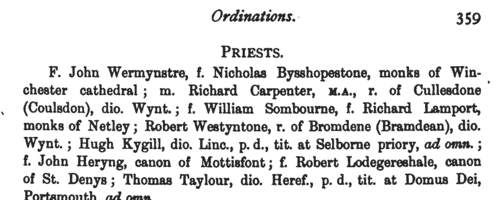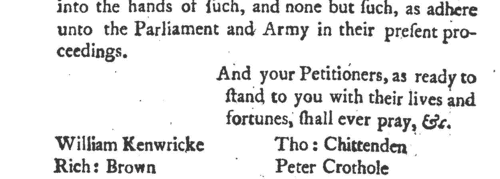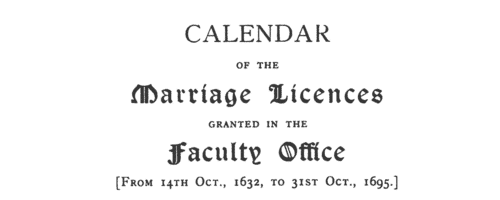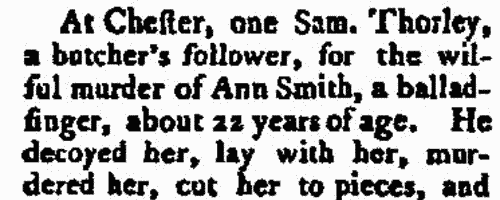Dunke Surname Ancestry ResultsOur indexes 1000-1999 include entries for the spelling 'dunke'. In the period you have requested, we have the following 9 records (displaying 1 to 9): Buy all | | | Get all 9 records to view, to save and print for £46.00 |
These sample scans are from the original record. You will get scans of the full pages or articles where the surname you searched for has been found. Your web browser may prevent the sample windows from opening; in this case please change your browser settings to allow pop-up windows from this site. Hampshire and Surrey clerks, clerics, monks and clergy
(1380)
Ordinations as acolytes, subdeacons, deacons and priests, from the register of bishop William de Wykeham of Winchester. Winchester diocese covered Hampshire and Surrey; the ordinations also attracted many persons from distant dioceses bearing letters dimissory from their ordinaries, and these are duly noted in the text. Many of these clerks would not go on to obtain benefices and remain celibate. The lists of subdeacons, deacons and priests state the clerks' respective titles, i. e., give the names of the person or religious house undertaking to support them. Monks and friars are indicated ('f.' = brother). The acolyte lists usually give parish of origin or title. The sample scan is from 1404.DUNKE. Cost: £6.00.  | Sample scan, click to enlarge

| Well-Affected Men of Kent
(1648)
After the capture of king Charles I by the forces of Parliament, this petition signed by over 1100 of 'the well affected in the county of Kent' was drawn up, calling on the Commons to prosecute his trial vigorously, and not to be satisfied with 'less than the blood of those persons, who have been the principall Authors' of the civil war; and also to transfer authority over all the militia in the country to 'his Excellency the Lord Fairfax'. Thomas Hearne the antiquary published a copy of the petition 'taken by no very skillfull scribe' in 1774, observing that such petitions were 'very diligently drawn up, not by the honest part, but by the very scum, of the Nation, signed generally by persons, in all respects, of an ordinary Reputation.' In this particular case, he noted, 'you'll scarce find one among them of any note or distinction.'DUNKE. Cost: £6.00.  | Sample scan, click to enlarge

| Allegations for marriages in southern England
(1669-1679)
The province or archbishopric of Canterbury covered all England and Wales except for the northern counties in the four dioceses of the archbishopric of York (York, Durham, Chester and Carlisle). Marriage licences were generally issued by the local dioceses, but above them was the jurisdiction of the archbishop, exercised through his vicar-general. Where the prospective bride and groom were from different dioceses it would be expected that they obtain a licence from the archbishop; in practice, the archbishop residing at Lambeth, and the actual offices of the province being in London, which was itself split into myriad ecclesiastical jurisdictions, and spilled into adjoining dioceses, this facility was particularly resorted to by couples from London and the home counties, although there are quite a few entries referring to parties from further afield. The abstracts of the allegations given here usually state name, address (street in London, or parish), age, and condition of bride and groom; and sometimes the name, address and occupation of the friend or relative filing the occupation. Where parental consent was necessary, a mother's or father's name may be given. The ages shown should be treated with caution; ages above 21 tended to be reduced, doubtless for cosmetic reasons; ages under 21 tended to be increased, particularly to avoid requiring parental consent; a simple statement 'aged 21' may merely mean 'of full age' and indicate any age from 21 upwards. These are merely allegations to obtain licences; although nearly all will have resulted in the issuing of the licence, many licences did not then result in marriage. DUNKE. Cost: £4.00.  | Sample scan, click to enlarge

| Treasury Books
(1711)
Records of the Treasury administration in Britain, America and the colonies, for 1711. These also include records of the appointment and replacement of customs officers such as tide waiters and surveyors.DUNKE. Cost: £4.00.  | Sample scan, click to enlarge

| Licences for marriages in southern England
(1632-1714)
The province or archbishopric of Canterbury covered all England and Wales except for the northern counties in the four dioceses of the archbishopric of York (York, Durham, Chester and Carlisle). Marriage licences were generally issued by the local dioceses, but above them was the jurisdiction of the archbishop. Where the prospective bride and groom were from different dioceses it would be expected that they obtain a licence from the archbishop; in practice, the archbishop residing at Lambeth, and the actual offices of the province being in London, which was itself split into myriad ecclesiastical jurisdictions, and spilled into adjoining dioceses, this facility was particularly resorted to by couples from London and the home counties, although there are quite a few entries referring to parties from further afield. Three calendars of licences issued by the Faculty Office of the archbishop were edited by George A Cokayne (Clarenceux King of Arms) and Edward Alexander Fry and printed as part of the Index Library by the British Record Society Ltd in 1905. The first calendar is from 14 October 1632 to 31 October 1695 (pp. 1 to 132); the second calendar (awkwardly called Calendar No. 1) runs from November 1695 to December 1706 (132-225); the third (Calendar No. 2) from January 1707 to December 1721, but was transcribed only to the death of queen Anne, 1 August 1714. The calendars give only the dates and the full names of both parties. Where the corresponding marriage allegations had been printed in abstract by colonel Joseph Lemuel Chester in volume xxiv of the Harleian Society (1886), an asterisk is put by the entry in this publication. The licences indicated an intention to marry, but not all licences resulted in a wedding. DUNKE. Cost: £4.00.  | Sample scan, click to enlarge

|  Masters and Apprentices
(1726) Masters and Apprentices
(1726)
Apprenticeship indentures and clerks' articles were subject to a 6d or 12d per pound stamp duty: the registers of the payments usually give the master's trade, address, and occupation, and the apprentice's father's name and address, as well as details of the date and length of the apprenticeship. 3 January to 31 December 1726DUNKE. Cost: £8.00.  | Sample scan, click to enlarge

| Intended brides and grooms in East Sussex
(1670-1739)
Sussex was in the Diocese of Chichester, divided into two archdeaconries - Chichester for west Sussex, Lewes for the east. Both archdeaconries exercised active probate jurisdictions, and issued marriage licences. Those issued by Lewes Archdeaconry court in this period were recorded in a series of registers (E3, E4, E5 and E6), which were edited by Edwin H. W. Dunkin and published by the Sussex Record Society in 1907. Each entry gives the date of the licence, the full names of bride and groom, with parish for each, and often stating whether the bride was a widow or maiden. To obtain a licence it was necessary for the parties to obtain a bond, with two sureties. One of these was often the prospective husband; the other might be a relative or other respectable person. From the bonds the names of the sureties were also copied into the register, together with the name of the church at which the wedding was intended to take place. These details are usually given until 1701; thereafter sureties and intended church are usually omitted. One deanery in Lewes archdeaconry, that of South Malling, was an exempt jurisdiction (or peculiar) of the Archbishop of Canterbury, which had separate probate and issued its own marriage licences, also recorded in a series of registers. This volume also includes the contents of registers C1 to C6 of the Deanery of South Malling, for marriage licences from 1620 to 1732. The details recorded are as with the main series, similarly lacking names of sureties and intended church after 1721. South Malling deanery comprised the parishes of Edburton, Lindfield, Buxted, Framfield, Isfield, Uckfield, Mayfield, Wadhurst, Glynde, Ringmer, St Thomas at Cliffe, South Malling and Stanmer. DUNKE. Cost: £4.00.  | Sample scan, click to enlarge

| People in the News
(1777)
Births, marriages and deaths, reports of crimes, trials and hangings, and general news, mainly from England, reported in the Chronicle section of the Annual RegisterDUNKE. Cost: £6.00.  | Sample scan, click to enlarge

| Freemen of Canterbury by Marriage
(1392-1800)
No man or woman could trade in the city of Canterbury without having obtained 'freedom' of the city, unless they paid an annual fee to do so. Admissions of freemen were recorded on the Chamberlains' Accounts of the city, which were prepared annually from Lady Day (25 March) to Lady Day until 1752, and thereafter each set runs from 1 January to 31 December. The accounts for 1392 are incomplete, but thereafter until 1800 there is a complete series except for the years 1455 to 1457 and the year 1552-3. Joseph Meadows Cowper, Honorary Librarian to the Corporation, produced this extract of the names from 1392 to 1800, and the volume was privately printed in 1903. There are five groups of freemen: those who obtained freedom after serving out an apprenticeship to a freeman; the children of freemen; those who married a freeman's daughter; those who claimed freedom by 'redemption', i. e. by purchase; and those who were honoured by a gift of the freedom from the Mayor and Court of Aldermen. Cowper published his lists divided into the five categories: the sample scan is from the list of those who obtained freedom by marriage. This is the index to those who gained their freedom by marriage.DUNKE. Cost: £4.00.  | Sample scan, click to enlarge

|
Research your ancestry, family history, genealogy and one-name study by direct access to original records and archives indexed by surname.
|












